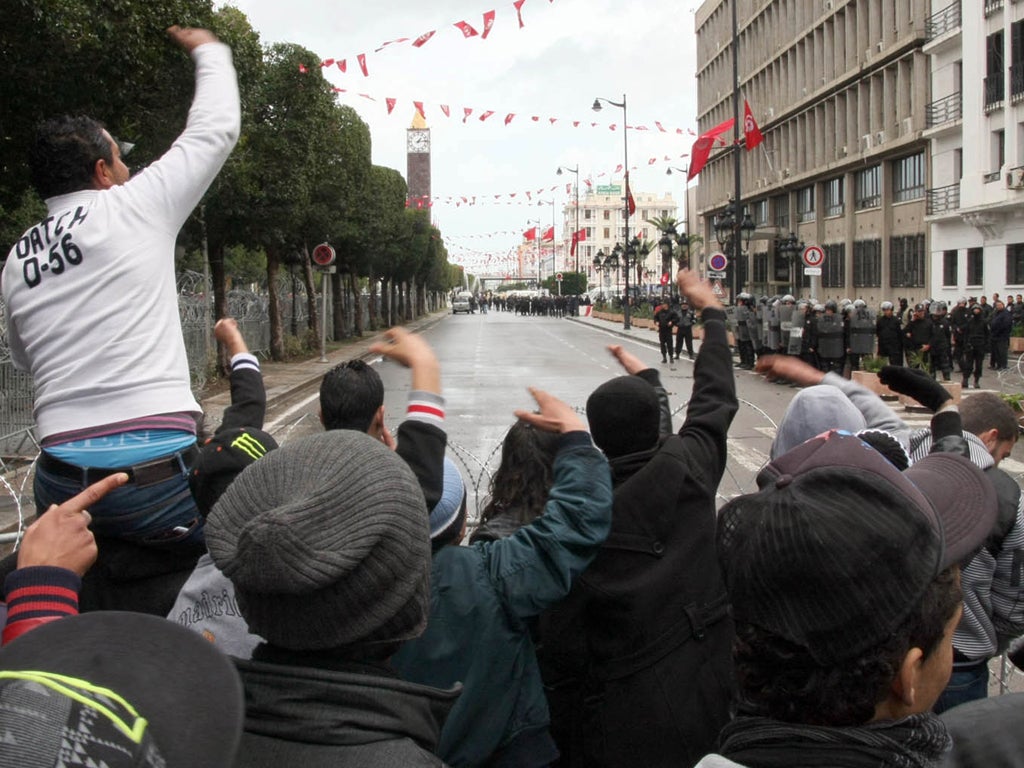Don't write off Tunisia's revolution just yet
They should keep calm and plod on. The public wants stability not chaos

Your support helps us to tell the story
From reproductive rights to climate change to Big Tech, The Independent is on the ground when the story is developing. Whether it's investigating the financials of Elon Musk's pro-Trump PAC or producing our latest documentary, 'The A Word', which shines a light on the American women fighting for reproductive rights, we know how important it is to parse out the facts from the messaging.
At such a critical moment in US history, we need reporters on the ground. Your donation allows us to keep sending journalists to speak to both sides of the story.
The Independent is trusted by Americans across the entire political spectrum. And unlike many other quality news outlets, we choose not to lock Americans out of our reporting and analysis with paywalls. We believe quality journalism should be available to everyone, paid for by those who can afford it.
Your support makes all the difference.It wasn’t Tunisia’s wish to be hailed as the exemplar of peaceful revolution in the Arab Spring. And it’s not its fault now that the assassination of an opposition figure should set off a host of headlines declaring the end of the dream of democratic change.
It isn’t, and there is something deeply unattractive in the way Western comment so readily seizes on the tensions between an Islamic government and a secularist opposition to suggest that Islam is somehow destined to tear the Middle East apart and make impossible a transition to pluralism and political freedom.
It is to fall into the trap set by the assassins of Chokri Belaid to accept that it does. The Tunisian politician was killed not for his outspoken opposition to Islamisation, although he certainly voiced that. Nor was his death implicitly or explicitly sanctioned by the ruling Islamist Ennahda party, although it did too little to protect him. He was killed because, at a delicately balanced time for a country, terrorism is a tactic of disruption which extremists hope to, and do, take advantage of.
For all the hopes imposed upon it, Tunisia hasn’t had an easy ride in the two years since it set off the Arab Spring by summarily, and relatively painlessly, ousting its long-term president Zine el-Abidine Ben Ali. Its finances have virtually collapsed. Tourism remains in the doldrums. Unemployment, particularly among young men, has soared. There have been riots in several of the main cities. The Prime Minister, Hamadi Jebali, has failed in recent weeks to form a broad coalition government including secularist groups. Now he has dissolved the cabinet and called for a government of technocrats to rule the country until new elections can take place, only to be rejected by his own party which (understandably) opposes such drastic measures when it won most seats in a fair vote only a year and a half ago.
It’s not so very different from Egypt, although Prime Minister Jebali and his secularist president, Moncef Marzouki, have tried a lot harder than President Morsi has to make peace with their opposition.Nor do you need an extensive knowledge of European history to think problems of this sort are far from unusual when countries move from one regime to another.
The delicacy of Tunisia’s position, like that of Egypt and Libya, is that it is extremely vulnerable to violent upset. It only takes an assassination or the deaths of protesters to set off a chain reaction which brings the whole house down. That’s why extremists go in for it. It’s not the mindless violence which politicians tend to call it. On the contrary, it’s very minded in its intentions, whether it’s the murder of the US Ambassador in Benghazi or the seizure of Western hostages in an Algerian gas plant. And very often it works.
There’s no easy answer except one of keeping calm and plodding on with political compromise, on the basis that most of the public wants stability rather than chaos. Certainly, the Tunisian government’s reaction in disbanding the cabinet and calling for elections seems somewhat extreme.
What it most needs to do is to establish an independent inquiry into the circumstances of the death and a rallying of political forces behind a unity government. Europe could help this process by offering the kind of economic assistance that has so far been slow to come amidst our fears of North African immigration.
All is not lost in Brussels - just yet
Today’s EU summit in Brussels will be the first David Cameron attends since declaring his support for an in/out referendum. Not that any of his fellow premiers will be indelicate enough to raise the matter. Why should they when all, including the Prime Minister, prefer this sleeping dog to lie until the next election? With luck, they think, by then it may be irrelevant.
The trouble is that this is exactly the approach they are all adopting to discussions about the EU budget. On this, at least Cameron has some support. Germany, Holland and Sweden all want a cut in a budget that the poorer countries oppose.
By any logical standards, this is when Europe should take a long, hard look at its structures and spending. But it’s also a time of recession and continuing problems with the euro. The interesting question is whether Cameron will use the opportunity to build alliances for European reform or whether he feels impelled to appeal to his backbenchers at home by refusing all compromise. He’s brought this on himself. But he has bought some room for manoeuvre by his referendum speech.
a.hamilton@independent.co.uk
Join our commenting forum
Join thought-provoking conversations, follow other Independent readers and see their replies
Comments